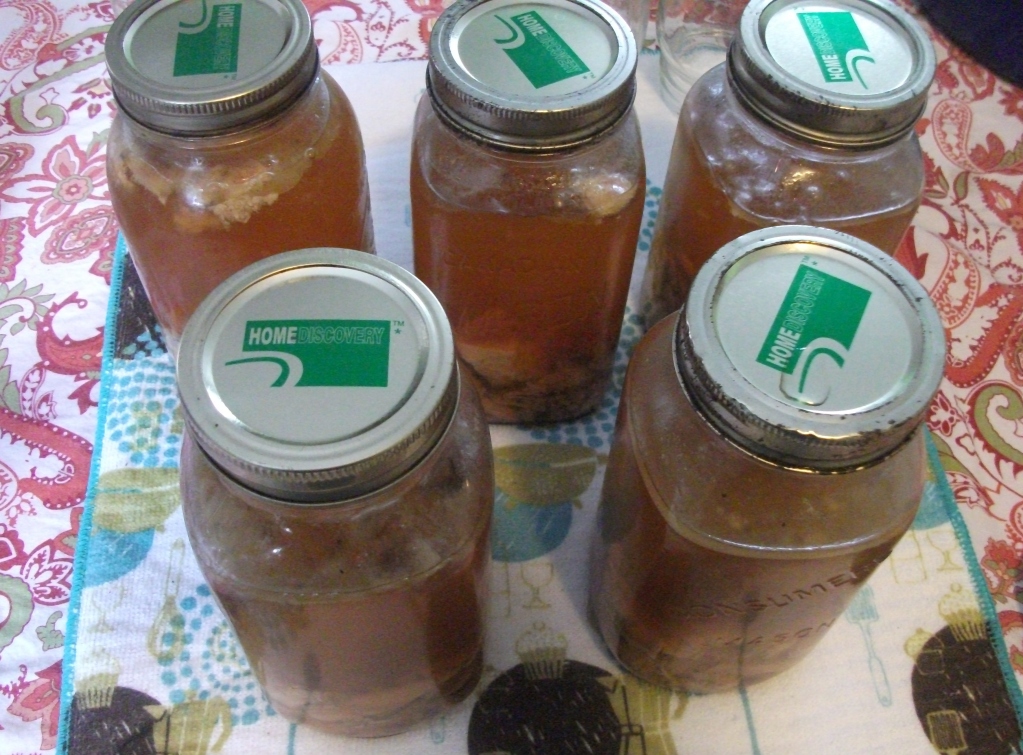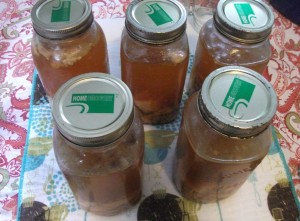If you're new here, you may want to subscribe to my RSS feed. Thanks for visiting!
Get the most bang for your turkey bucks by using every last bit of your bird. Instead of eating turkey until you can’t stand the thought of more poultry, break out the pressure canner and put it away! You can put the folks at Campbells Soup to shame by making a delicious soup base that just needs the addition of rice or noodles at serving time. The best part is, if your family falls victim to a cold or flu, you have homemade turkey soup at hand in little more time than it takes to open one of those ubiquitous red and white cans filled with sodium, MSG and other nasty chemicals.
After a few meals of roast turkey, remove most of the meat from the bones and place it in the refrigerator. You’ll be left with a rather desolate-looking carcass. Put that in your crockpot along with the reserved neck and giblets (if you didn’t use those for gravy). Add some veggies from the holiday snack tray – carrots, peppers and celery are great additions! Add a couple of tablespoons of salt, a head of garlic and 4-6 onions. Note: there’s no need to peel the garlic and onions as long as they are organic – just wash them well. Fill the crockpot with water and add your favorite spices (not sage – it tastes terrible when canned). I used whole peppercorns, salt, oregano and bay leaves.
Put the crockpot on low for 12-14 hours and let it simmer undisturbed overnight. Zzzzzz……
The next day, strain the contents of the crockpot into a large container – I use a big soup pot and a metal colander. After allowing the bones to cool remove any meat that you would like to add to your soup. I always give our dog a big treat – a bowl of turkey with gristle, fat and skin. (She’s a little on the skinny side because she runs constantly when she’s outside so I think that the occasional fat intake is good for her.) She also likes the mushy carrots.
Take all of the meat that you put in the refrigerator the night before and cut it into bite-sized pieces. I like a mixture of light meat and dark meat for this purpose. Also cut up the meat you removed from the crockpot.
Place approximately 1 cup of turkey in each of your sanitized jars. (I ended up with about a cup and a half in each jar.) Add 1-2 cloves of garlic to the jars.
You will have a rich, dark beautiful stock from the overnight crockpot project. Ladle this into the jars over your cut-up turkey and garlic. Leave 1 inch of headspace at the top of the jars. If you run out of broth, top it up with water – don’t worry – your broth will still be very flavorful.
Wipe the lip of your jars with a cloth dipped in white vinegar. Place the lids on and process them in your pressure canner for 90 minutes at 10 pounds of pressure, adjusting for altitude.
Your result will be a deep golden, rich meaty soup. This is an excellent base for turkey and dumplings, as well as any type of turkey soup.
From our turkey, we ate 12 servings before canning the rest. The canning project turned into an additional 20 servings (with the necessary addition of a carbohydrate). End result? 32 servings from one turkey!
Now is the time to buy turkey – many stores will have great sales since there won’t be a huge demand for turkey again until Easter. I have 2 more in my freezer and plan to cook one per month and preserve the remainder.

















11 Responses
I made turkey and dumplings with my leftover turkey. I also made some home made cat food out of the rest.
I would like these recipes to be in a printable format. I con’t know how to cut and paste. It takes a lot of time to write them out on a recipe card. I tried to print the whole article and it is so many pages with all the stuff on the sides that I don’t want to print. I guess that is the gripe I have with alot of websites that don’t have a way to print just the info.
Thanks,
Suzanne S.
Suzanne – let me look into this and I’ll do my best to make this work in an easily printable format. Be patient, though – I’ve got to talk to my ‘puter guru! 🙂
Thank you very much for the suggestion!
~ Daisy
Thank you for posting. I’m clueless on canning, but I love your idea of preserving the broth and left over turkey. What is the best pressure cooker to use for canning?
Tee ~
You want to purchase a pressure canner as opposed to a pressure cooker. The two brands that I recommend are the All-American (top quality but expensive) or the Presto (moderate quality, moderate price).
Happy canning ~
Daisy
What is the shelf life for the canned turkey?
Approximately one year 🙂
You say that the home-canned turkey has a shelf-life of a year. I just pulled two jars of home-canned chicken breast off my shelf yesterday (June, 2014) for a yummy chicken and broccoli casserole. I had canned it in September, 2010, almost four years ago. It smelled and tasted fine, and the texture was no different than the jar I opened only a month after canning.
I believe as long as the seal is intact and they were processed for the required time, home-canned products are good for years beyond the time you suggest. (Many commercially canned products also are good for years beyond their “best-if-sold-by” date.) We can’t afford to be throwing out good food.
What size did you use for the 1C turkey?
What size of jar did you use? I’m guessing 1 litre / 1 US quart from the processing time and photos.
Yes – quart jars.:)